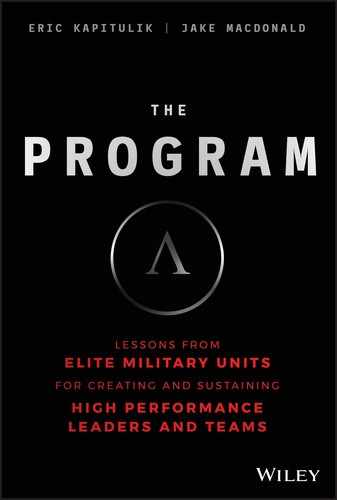73
Three Important Questions
BATTLEFIELD COMMUNICATION IS incredibly important to athletes, coaches, and members of our military and first responder communities on their battlefields. These three questions are vitally important for our success in the corporate one. Communication is the bridge that links our teammates. Great organizations make it a habit to overcommunicate. If CLAPP forms the basis of how we communicate, the question still remains as to what we communicate. As a young lieutenant in the Marine Corps, Mac’s commanding officer made the platoon commanders place a sign on their desks with three questions on it. Great teammates and great team leaders answer these three questions every day. Breakdowns in communication occur when we fail to consistently ask, answer, and follow through on each. These questions are:
Attempting to answer all of these questions is incredibly time-consuming and energy draining. Often, when we do so, we can’t answer all of them with 100% certainty, so we choose to answer none of them. Instead, we talk ourselves into believing that we don’t know anything (which, by the way, is “something” and absolutely can, and should be, communicated), it is unimportant, nobody else really needs to know it, and therefore there is no need to say anything. We “put our head down” and just do our job. Remember, our job is not only to dribble, pass, or shoot. Our job is not just to do the tasks associated with our job title. Our job is to be a great teammate and a great team leader. To be great, we must effectively communicate. As former University of Miami Hurricane Head Coach, and current Detroit Lion Defensive Line Coach, Al Golden says, “In the absence of communication, there is the unknown, there is darkness. And we are severely limited in what we can do in it!” When we fail to communicate effectively, regardless of the reasons (read: excuses), our team is “in the dark,” and it inevitably leads to a breakdown in unit cohesion and mission failure. Don’t allow it! Stay fanatically focused in answering three simple questions: What do I know? Who else needs to know it? Have I told them? Ask these three questions every day and overcommunicate your answers to them throughout your entire organization. Great teammates and great team leaders do, and it helps ensure great unit cohesion and, ultimately, the accomplishment of our missions that are so dependent on it.
